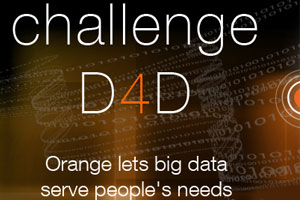Energy Team scoops first prize at global data open innovation competition
20 Apr 2015
The University of Manchester and the Santa Fe Institute, with support from the Université Cheikh Anta Diop, won the Energy prize and the first (“Grand”) prize in the Orange Data for Development (D4D) Challenge Senegal for using mobile phone data for electrification planning

The winning research team includes Dr Eduardo Alejandro (Alex) Martinez-Cesena and Dr Pierluigi Mancarella, from the School of Electrical and Electronic Engineering. The award ceremony took place at the MIT Media Lab on 10 April.
The global competition was launched last year under the patronage of the Senegalese Ministry of Higher Education and Research and aimed to challenge organisations to produce solutions, based on mobile data, for the purpose of societal development and the welfare of the population in Senegal.
In conjunction with Sonatel and Orange, anonymised data samples were extracted from Sonatel’s mobile network and made available to over 250 international research laboratories around the world. The challenge was organised around five core questions and themes relating to health, agriculture, transportation/urban planning, energy and national statistics.
The lack of information on activities and therefore on potential energy needs in rural areas, especially in developing countries, has often hindered development of energy infrastructure. On the other hand, mobiles are widespread everywhere. By showing how it is possible to use mobile data as a proxy for activity intensity and energy requirements, the winning research paves the way to developing totally new approaches to electrification of rural areas, with potentially huge socio-economic benefits for Senegal as well as other developing countries. In particular, the University of Manchester’s team has developed, first in the world, a modelling framework and a relevant tool to use mobile data to inform sustainable energy infrastructure development, with various solutions that include renewable energy sources and microgrids. The model also takes into account that newly electrified areas would attract more people and activities, thus also considering social aspects besides techno-economic ones.
“I am proud of this research and its outputs because it can really make a difference for people who currently lack basic energy services”, says Dr Martinez-Cesena, who is a Research Associate in the Electrical Energy and Power Systems group.
“We knew we had won the Energy prize, but then it came as a surprise that we had also won the ‘Grand’ prize of all competition’s categories”, says Dr Mancarella, who is a Reader in the Electrical Energy and Power Systems group. “We received so many compliments for this research work, which is first of its kind, that we really felt like pioneers in the cradle of pioneers, at MIT Media Lab.”
Ongoing work in Dr Mancarella’s research team now aims to extend the socio-technical energy system modelling framework proposed to applications in developed countries and especially in urban areas in the context of Smart Cities.
The framework for combining mobile data analysis and energy-infrastructure engineering techniques appears in the research paper the team submitted for the competition
For more information, visit:
- Using Mobile Phone Data for Electricity Infrastructure Planning
- National development and population welfare take centre stage as Orange announces the winners of its big data ‘Data for Development’ Challenge Senegal
